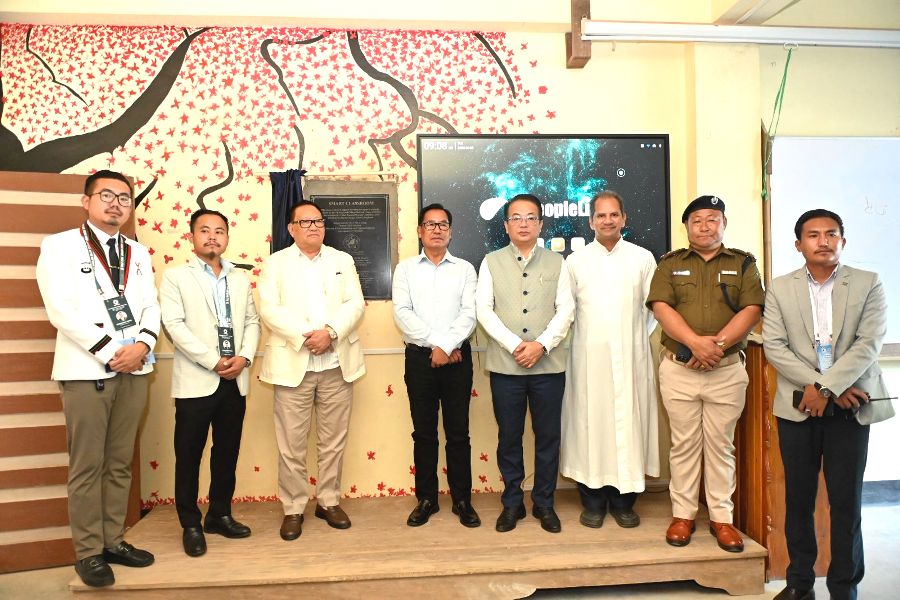THURSDAY, OCTOBER 30, 2025
- Home
- Dy. CM TR Zeliang urges students to join hands for a progressive Nagaland
Dy. CM TR Zeliang urges students to join hands for a progressive Nagaland
Deputy CM TR Zeliang calls upon the student community to work together to build a progressive Nagaland.
Share

KOHIMA — Deputy Chief Minister TR Zeliang on Tuesday called upon the student community to work together to build a Nagaland where every young person has the opportunity to learn, to lead, and to live with dignity.
The deputy CM was addressing the inaugural session of the All Nagaland College Students’ Union (ANCSU) 22nd biennial general conference held at St. Xavier College, Jalukie, Peren district.
Commending the union for its role as a pillar of unity and student advocacy, Zeliang lauded its constructive approach to leadership and efforts toward educational reform, transparency, and student welfare. He urged the union to continue serving as a bridge between students, the government, and society.
According to the deputy CM, leadership is about vision, service, and example and not about authority or position. He added that true leaders lead with conviction, inspiring others by what they do and not by what they say.
Maintaining that social responsibility is what gives leadership its moral compass, he said, “Leadership without social responsibility is incomplete, and it becomes meaningful only when it is used to uplift others and to build stronger communities.”
Also read: Minister KG Kenye urges students to embrace virtues of elders
He asserted that the present generation must consciously choose to transcend the limitations that held back previous generations.
Zeliang out that tribalism is the single greatest hindrance to the growth and prosperity of the State and stated that the onus is on the youth of today to be the antidote to this vice.
He highlighted that Nagaland’s is estimated at around 16-17 lakh, and comparing that to other large states in India, it does not even make up the population of a district.
“Our State, with such small numbers, we further divide ourselves by being tribalistic in our thoughts and approach. Once we are out of Nagaland, we do not introduce ourselves as an Ao, Angami, or Zeliang but rather as a Naga and proudly owning it. Why cannot we do the same when we are in Nagaland and stop tribalism altogether and ensure that all Nagas progress and live together as one united family?” he asked.
Read more: Land issues cleared, no major hurdles for Nagaki City project — Zhaleo Rio
Noting that the state is blessed with a youthful population filled with energy, creativity, and a desire for progress, he stated that potential alone is not enough and must be guided by discipline, dedication, and direction.
He advised the students to use their knowledge not merely to seek personal success but to serve society, in order to be the generation that transforms challenges into opportunities, a generation that builds rather than blames, and a generation that unites rather than divides.
Zeliang also exhorted the students that leadership does not begin when they hold an office; it begins when they choose to take initiative. Each of them can lead in their classrooms, communities, and everyday choices.
“Be leaders who serve before they seek. Be citizens who build before they demand,” he said.
The deputy CM exuded hope that the event will become a turning point to inspire a new generation of Naga youth to lead with wisdom, act with compassion, and dream with courage.
Mteisuding Heraang, president of the Naga Students’ Federation (NSF), delivered greetings and stated that the gathering is not merely an administrative exercise but a reaffirmation of the vision and values that have long guided the student movement in the State, a vision rooted in the pursuit of justice, education, unity, and social transformation.
He opined that leadership today is no longer confined to positions of authority. It is defined by one’s ability to inspire, to listen, and to act with empathy.
“True leadership begins when we acknowledge our responsibility toward society, when we use our talents and education to uplift others, to challenge injustice, and to contribute meaningfully to the collective good,” he said.
As student leaders and future policymakers, it is imperative that they recognise the moral dimensions of leadership, he stated.
“In the context of our Naga society, leadership must also be about reconciliation, understanding, and building bridges across differences so that our people may move forward with one heart and one vision,” Heraang said.
Earlier, the presidential address was delivered by Tenyesinlo Bukh, president of ANCSU.
The programme was led by Vimeyeikho Vitso, tribunal general of ANCSU. The event featured a choral performance by St. Xavier College, a cultural presentation by Pfutsero Government College, and a special song by Alder College, Kohima.
Earlier, the deputy CM dedicated a smart classroom and unveiled the ANCSU monolith.

